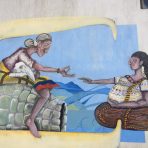Transforming our World by 2030: Difficult Knowledge and Scientific Activisms
Transforming our World by 2030: Difficult Knowledge and Scientific Activisms
Categories: Lectures and Seminars | Intended for Carleton Community, Current Students, Staff/Faculty

Location Details
Online via Zoom
Contact Information
Department of Sociology and Anthropology, contact via email, soc-anthro@carleton.ca
Registration
No registration required.
Cost
Free
About this Event
Host Organization: Department of Sociology and Anthropology
More Information: Please click here for additional details.
Following the launch of the UN’s Sustainable Development Goals, nutrition policymakers took up the problem of how to translate the term “Sustainable Development.” This talk examines this translation problem, drawing from Dr. Yates-Doerr’s ethnographic work with scientists over the past decade to illustrate the everyday negotiations that give shape to the UN’s 2030 agenda. Dr. Yates-Doerr explores “sideways” methods of collaboration, putting the Mam-Maya term “tanj’abela” in conversation with the languages of sustainability used by the United Nations. This juxtaposition allows Dr. Yates-Doerr to theorize transformation as a mode of “being with” in time and place and not as an urgent reaction to an impending, deadly future. Dr. Yates-Doerr ends with a provocation about how conceptual multiplicity can be used to transform the spaces between science and activism.
Emily Yates-Doerr (Associate Professor, Oregon State University and the University of Amsterdam) is an anthropologist who studies public health nutrition in the US and Guatemala. She is associate professor of anthropology at Oregon State University and the University of Amsterdam and author of The Weight of Obesity: Hunger and Global Health in Postwar Guatemala (California Press, 2015). The talk she will present at Carleton is drawn from her second book in progress, Doing Good Science: When Fetal Development is Global Development in Guatemala–and Beyond.